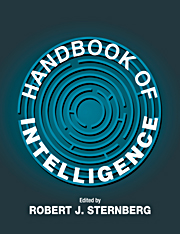Book contents
- Frontmatter
- Contents
- Preface
- Contributors
- PART I THE NATURE OF INTELLIGENCE AND ITS MEASUREMENT
- PART II DEVELOPMENT OF INTELLIGENCE
- PART III GROUP ANALYSES OF INTELLIGENCE
- 7 Intelligence and Mental Retardation
- 8 Intelligence and Giftedness
- 9 Group Differences in Intelligence
- PART IV BIOLOGY OF INTELLIGENCE
- PART V INTELLIGENCE AND INFORMATION PROCESSING
- PART VI KINDS OF INTELLIGENCE
- PART VII TESTING AND TEACHING INTELLIGENCE
- PART VIII INTELLIGENCE, SOCIETY, AND CULTURE
- PART IX INTELLIGENCE IN RELATION TO ALLIED CONSTRUCTS
- Author Index
- Subject Index
8 - Intelligence and Giftedness
Published online by Cambridge University Press: 05 June 2012
- Frontmatter
- Contents
- Preface
- Contributors
- PART I THE NATURE OF INTELLIGENCE AND ITS MEASUREMENT
- PART II DEVELOPMENT OF INTELLIGENCE
- PART III GROUP ANALYSES OF INTELLIGENCE
- 7 Intelligence and Mental Retardation
- 8 Intelligence and Giftedness
- 9 Group Differences in Intelligence
- PART IV BIOLOGY OF INTELLIGENCE
- PART V INTELLIGENCE AND INFORMATION PROCESSING
- PART VI KINDS OF INTELLIGENCE
- PART VII TESTING AND TEACHING INTELLIGENCE
- PART VIII INTELLIGENCE, SOCIETY, AND CULTURE
- PART IX INTELLIGENCE IN RELATION TO ALLIED CONSTRUCTS
- Author Index
- Subject Index
Summary
What do we mean when we call a child or adult gifted? How do we assess giftedness? Is giftedness synonymous with high intelligence? High IQ? What other constructs are considered to be part of the giftedness construct? To what degree is adult giftedness related to childhood aptitude and to what degree are factors such as motivation, effort, or learning style predictive of eminence? Is giftedness unidimensional or multidimensional? Is genius the same as being gifted? What is the relationship of creativity to giftedness? Does giftedness exist, or is it an invention of society to represent what we value in children and adults, or is it simply an artifact of educators' desires to sort students? The debate surrounding these questions and the presumed answers have affected the ways that schools have done business for most of this century.
Outstanding performance and expertise are recognized and praised in all societies, but not all societies value and reward the same talent. The label gifted (or talented, highly able, bright, smart, capable, wise, or intelligent) is not assigned to the same exceptional performance across all societies or to persons with the same particular constellation of traits. Some societies extend their recognition beyond the domain of cognitive accomplishments to include physical or athletic prowess or artistic, performing, and productive talents. For example, basketball prowess is much more highly valued in our society than in any other. Even when a society limits its conception of superior ability to the domain of intellectual functioning or intelligence, it is difficult to find consensus regarding the meaning of giftedness.
- Type
- Chapter
- Information
- Handbook of Intelligence , pp. 159 - 175Publisher: Cambridge University PressPrint publication year: 2000
- 18
- Cited by

